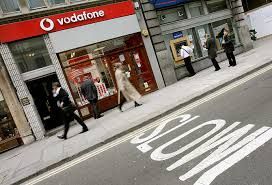The petition was withdrawn after a bench of justices Badar Durrez Ahmed and Siddharth Mridul agreed with the Centre that as per Telecom Regulatory Authority of India Act there was an alternative remedy available before the Telecom Disputes Settlement and Appellate Tribunal.
 Vodafone on Friday withdrew from Delhi High Court its plea alleging the Centre is indulging in ‘arm-twisting’ and ‘coercive’ tactics by refusing to sign its unified licence till the telecom major unconditionally accepts the ‘restrictive’ clauses in the licence.
Vodafone on Friday withdrew from Delhi High Court its plea alleging the Centre is indulging in ‘arm-twisting’ and ‘coercive’ tactics by refusing to sign its unified licence till the telecom major unconditionally accepts the ‘restrictive’ clauses in the licence.
The petition was withdrawn after a bench of justices Badar Durrez Ahmed and Siddharth Mridul agreed with the Centre that as per Telecom Regulatory Authority of India Act there was an alternative remedy available before the Telecom Disputes Settlement and Appellate Tribunal.
"Writ petition is dismissed as withdrawn," the court said and gave liberty to Vodafone to approach TDSAT.
During the brief arguments, Additional Solicitor General Sanjay Jain, appearing for Department of Telecommunications, said that as per Telecom Regulatory Authority of India Act, Vodafone is a licensee and thus should have moved TDSAT.
Vodafone had contended in its plea that DoT instead of signing and executing the ULs had at the last moment informed them that their request for deletion of ‘restrictive’ clauses in licence pertaining to roaming cannot be accepted.
Vodafone had submitted that the clauses in the UL take away the rights already granted to it and upheld by TDSAT on April 29, 2014.
TDSAT had on April 29 overturned a government ban on offering 3G mobile services beyond their licensed zones through roaming pacts saying it was in national interest to allow better utilisation of scarce radio frequency.
The telecom major had sought orders declaring the ‘restrictive clauses’ as illegal and their deletion from UL.
The telecom company had accused DoT of ‘adopting coercive steps’ saying ‘if UL is not signed in a timely manner, then the existing 22 million subscribers in three service areas -- Mumbai, Delhi and Kolkata -- of the petitioners, being provided services under existing unified access service licence, will face disruption of services after November 29, 2014."
Vodafone's UASL for these service areas is set to expire on November 29.
Vodafone had also contended in its plea that as it was in a ‘vulnerable’ position, owing to impending expiry of its UASL, and DoT, being aware of consequences for the company, ‘is arm-twisting, abusing its position/powers as a licensor to delay and deny’ the telecom major's entitlement to use the spectrum obtained in the auctions.
Vodafone had contended that it bought/acquired spectrum in 2010 and 2014 at a total cost of around Rs 24,000 crore (Rs 240 billion), of which Rs 12,000 crore (Rs 120 billion) has already been paid.
According to Vodafone's plea, DoT has already accepted their applications, conveyed approvals and issued Letters of Intent (LoI) on August 28, September 15 and September 23 for Mumbai, Kolkata and Delhi areas respectively.
The company had claimed that it too has unequivocally and unconditionally accepted these LoIs and have fulfilled each and every requisite condition thereunder through their acceptance letters.
As per the new telecom policy, unified licences are to be given to telecom companies to use the spectrum acquired by them and provide mobile services to their subscribers.
Vodafone has also contended in its plea that the UL of another telecom service provider was signed only after it moved the Bombay High Court.
Bharti Airtel, Vodafone and Idea Cellular, the three biggest mobile service providers in the country, and Reliance Jio were among eight companies that bid a combined Rs 61,162 crore (Rs 611.62 billion) for spectrum in the 900 MHz and 1800 MHz bands offered by the government during a 10-day auction that ended on February 13 this year.











 © 2025
© 2025